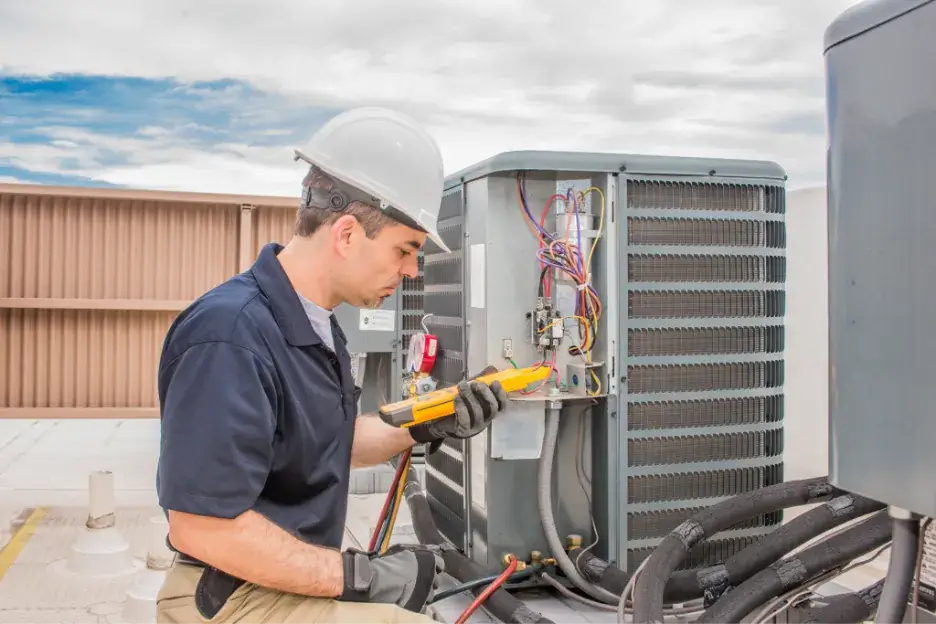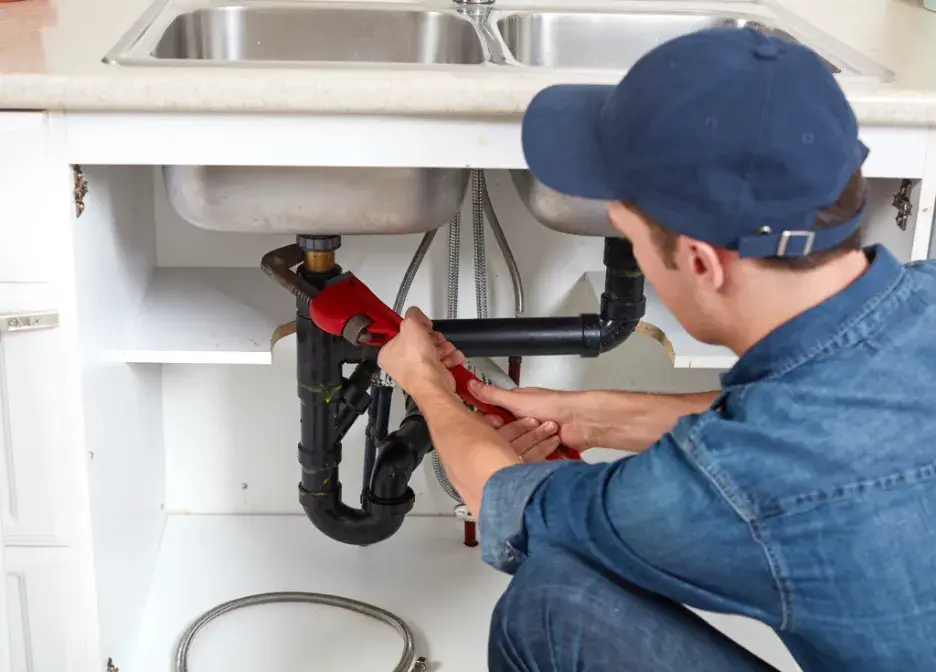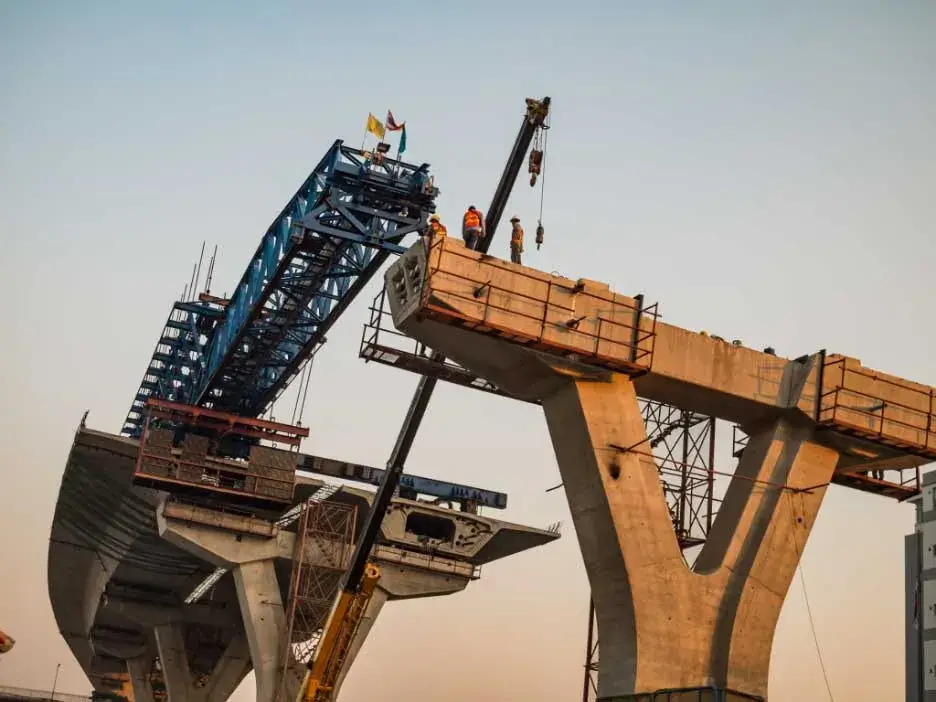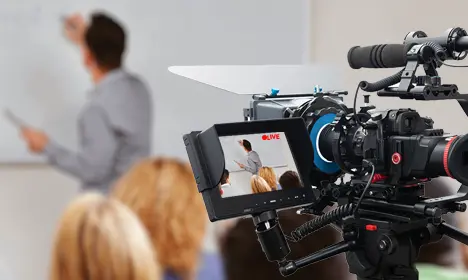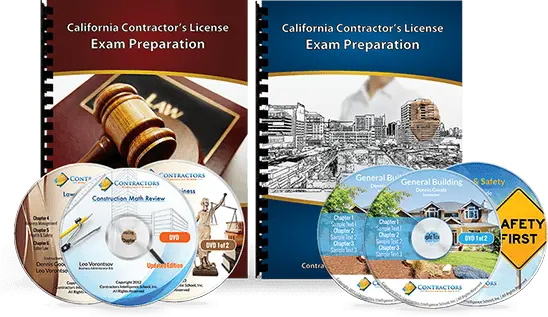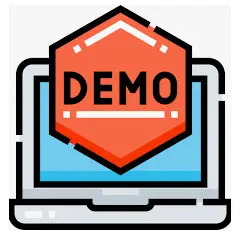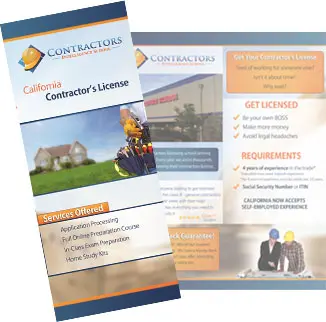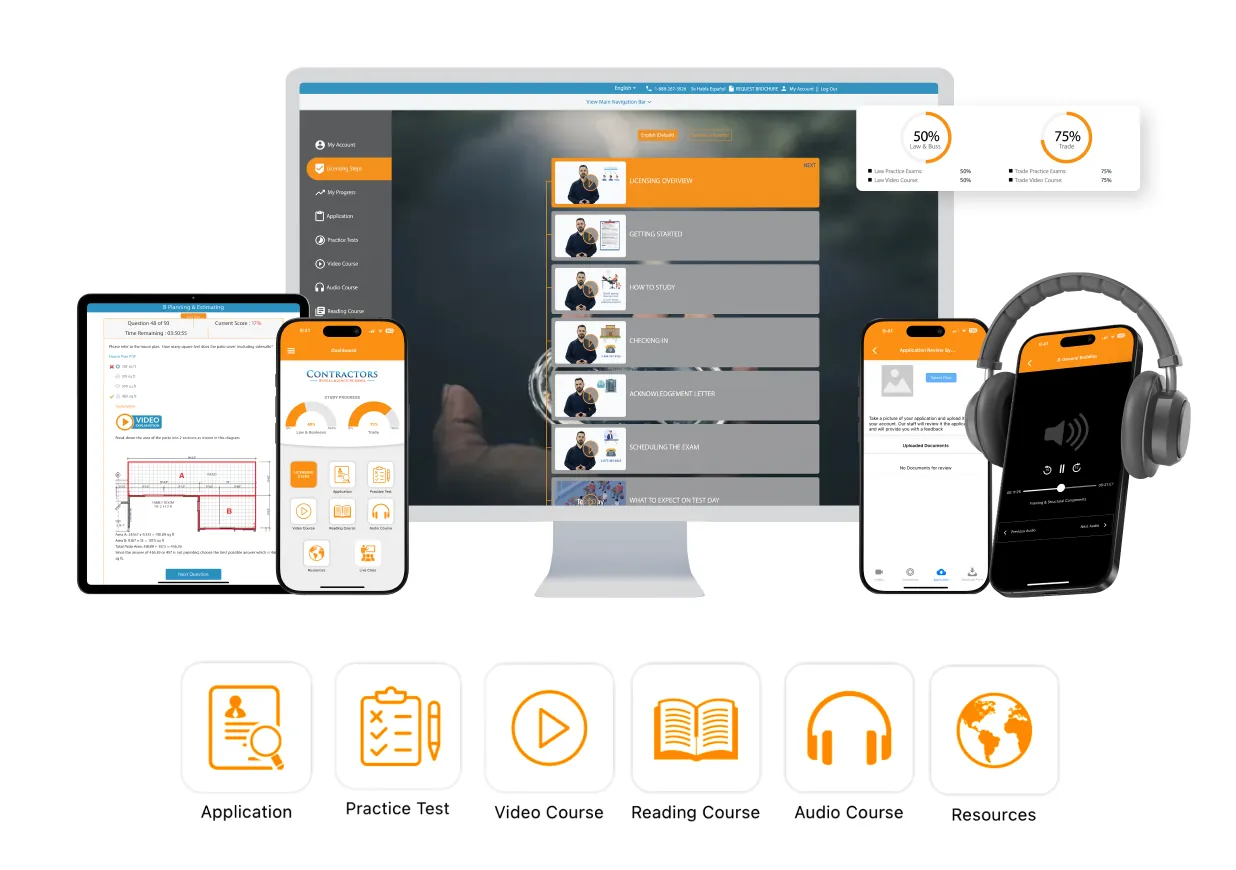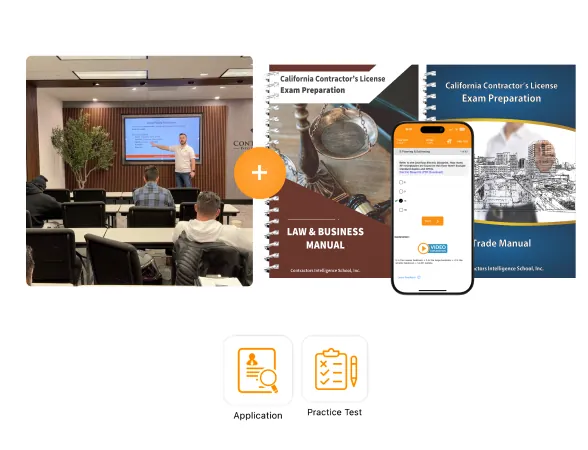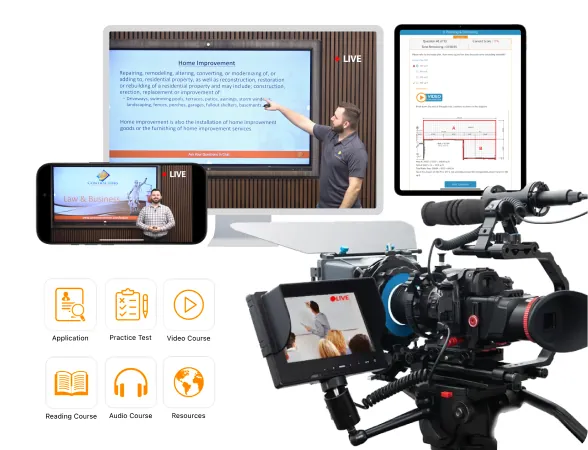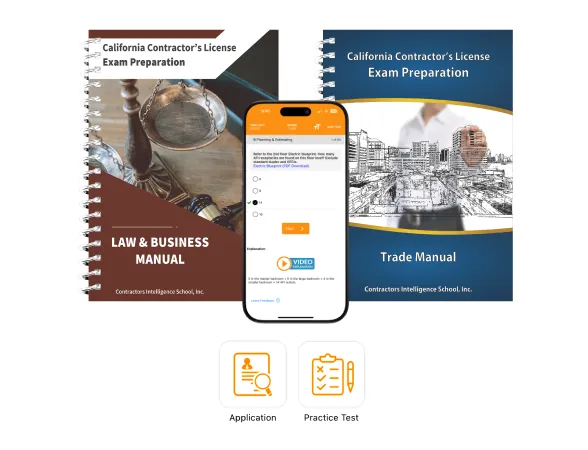How to Obtain Your B-General Building Contractors License in California

Content table
Have you been working in construction for years and want to level up? Getting a B-General Building Contractor’s License in California is a significant step forward in your professional journey, opening doors to a broader range of projects, from building custom homes to managing major renovations.
#1 California Contractors License Prep Program.
Try our free interactive
course demo.
So, how to get a contractor’s license in California? In this guide, we’ll break the licensing process step by step and walk you through each stage in clear, easy-to-understand language.
What is a B-General Contractor’s License in California?
In California, the Contractors State License Board (CSLB) issues various classifications of contractor licenses. With a general contractor license, you are allowed to oversee projects that involve two or more unrelated building trades, for example, a job that includes both plumbing and electrical work or one that involves carpentry and tile installation. Basically, you are the person who ensures all parts of a construction project seamlessly come together.
Why do you need this license?
In California, any construction job that totals $1,000 or more, including materials and labor (unless a business permit or hiring any employees is needed), legally requires a license. Operating without a building license can put you at risk of fines, legal penalties, and even misdemeanor charges.
A general contractor license proves your professional experience, knowledge, and credibility, enabling you to access bigger projects, including commercial buildings and high-end residential developments, command higher rates, and win better contracts to expand your business.
Step-by-Step Guide to Getting a B General Contractor License in California
So, how to apply for a general contractor license? It’s a multistep process that involves a number of nuances and details you should observe. Yet, while it might seem a little daunting at first, with the proper guidance, it’s completely manageable.
Step 1: Determine Eligibility
Before you find out how to obtain a general contractor license in California, you should figure out if you actually qualify. To be an eligible applicant, you should:
- Demonstrate 4 years of journeyman-level experience in the past 10 years;
- Be at least 18 years of age;
- Possess a Social Security Number or Individual Taxpayer Identification Number (ITIN).
In essence, “Journeyman level” is defined as the experience gained when an individual is no longer a trainee or apprentice and that individual can perform general building work without supervision. The four years of experience must include framing or rough carpentry and a minimum of two unrelated core trades, which can consist of concrete, electrical, plumbing, roofing, and HVAC. A college degree can substitute up to three years of such experience. The most important thing is that the experience should be verifiable.
Step 2: Submit Application to CSLB
If you meet the general B license requirements, the next step is to document your experience. Visit the CSLB’s official website and fill out the Certification of Work Experience Form. On this form, both you and your certifier will have to provide details about the company you worked for, the dates of employment, and the specific type of work that was performed that qualifies you for this license. This form must be signed by the certifier, someone who can vouch for your experience, such as a current/former employer, contractor, supervisor, coworker, or even a client if you’ve done owner-builder work. Notably, CSLB may require additional documentation to verify your experience.
When completed, the Certification of Work Experience Form should accompany your Application for Original Contractor License (Form 13A-1), which you can download from the CSLB website or fill out online. Pay the application fee, which is now $450, and mail your completed application, Certification of Work Experience, and payment to the CSLB’s Sacramento office.
Within 2–4 weeks after submitting your application, the CSLB will send you an acknowledgment letter by mail. This letter will contain the application fee number and a contractor PIN to check your application status directly on the CSLB's website. Once you see the text “Application Posted,” it means that the CSLB has approved your application. In a short amount of time, you'll receive another letter in the mail instructing you to schedule your exam(s).
As a student at Contractors Intelligence School, you will have ample resources available to make this step in the process simple. We will ask you to submit your completed application for review, so you can be sure that when it ends up at the CSLB, you have the best chance of getting approved quickly.
Step 3: Undergo Background Check
California law requires all applicants to undergo Live Scan fingerprinting for a criminal background check. You'll receive 3 identical documents called “REQUEST FOR LIVESCAN SERVICE.” You should complete your fingerprinting once you receive the request, mainly so you don't delay the issuing of your license later.
Simply bring the LIVESCAN pages with you to an authorized fingerprinting location. After the scan, they'll keep a copy and give you the remaining pages back. You need to mail one of the hard copies to the CSLB. Even if you have a criminal record, it doesn’t automatically disqualify you. The CSLB will evaluate on a case-by-case basis.
If you don't receive the LIVESCAN request forms, don't worry. There's a chance you don’t need them. For example, if you were a registered salesperson for a previous employer, or you were listed as additional personnel on another contractor's license, you won't need to redo the fingerprinting. Alternatively, you may contact the CSLB and request a duplicate.
Step 4: Pass the Exams
As of April 1, 2022, the CSLB has outsourced its examinations to a company called PSI Exams. As another checklist item, you will need to contact PSI and schedule your required exam(s). As of today, the exams are only administered in English and Spanish. If you want to use a translator or need an American with Disabilities Act accommodation, you'll need to make those arrangements well before your scheduled exam date.
On test day, arrive 15–30 minutes early and bring a valid photo ID. After being admitted, you will be provided with everything necessary to complete your exams. The law & business exam will be a multiple-choice exam and will contain approximately 115 questions. You will be given 3-½ hours to complete this exam. The trade exam will also contain about 115 multiple-choice questions and have a time limit of 3-½ hours. Your test results are instantaneous. As you walk out of the testing center, you will be handed a printout telling you if you passed or failed your exam.
One thing to note here is that the Law and Trade exams are independent of each other. You will be scheduling these exams on separate days or on the same day but at different time slots. If you happen to fail one of the exams, you only come back to the failed portion. As a matter of fact, you can reschedule the failed portion as many times as needed within 18 months after your application has been posted, though you'll need to pay a rescheduling fee each time. Just note that there is a 3-week cooling-off period for every failed attempt. This means that you won't be allowed to test for a minimum of 3 weeks.
Failing the exam does NOT affect your current contractor’s license in any way; plus, after completing a course at Contractors Intelligence School, you’ll have a 98% chance to pass on your first try. Consider a fee of $51.43 applies to each new exam scheduling or rescheduling.
Step 5: Get a Contractor Bond, Insurance, and Pass an Open Book Asbestos Exam
All contractors in California are required to obtain a contractor’s bond; however, depending on your ownership percentage and the type of business, such as LLCs, which require an additional bond, further bonding may be necessary. Regardless, get the needed bonding through a reputable bond company or, as an alternative, provide the CSLB with the necessary cash deposit in the form of a check or money order covering $25,000. If needed, Contractors Intelligence School works with Pro-Builders Insurance Agency to offer students bonding and other insurance options. It usually costs around 250 per year.
You’ll also have to submit proof of workers' compensation insurance before your license number can be issued. If your company doesn't have employees, you may qualify for an exemption. Under current law, certain license classifications cannot be exempt from workers’ compensation. It is always best to contact your insurance agent for additional details. In 2028, California will require all licensed contractors, even those without employees, to carry workers’ compensation insurance coverage.
Finally, there's the asbestos open-book examination. You’ll be instructed to complete this open-book exam online. It mainly serves to give contractors information about asbestos and its dangers. You will be given a total of 90 days to complete these final steps after passing your required exam(s). The sooner they are completed, the sooner your license number can be issued.
Step 6: Receive Your License
To finalize the application for a general contractor license, you should pay an initial licensing fee of $200 for a sole owner and $350 for a non-sole owner. You can write a check or submit a money order. This fee is used to activate your contractor's license for the first two years. On the flip side, if you don't plan on operating your business immediately, you’ll still have to submit the initial license fee, but you'll also need to complete the appropriate inactive license form.
Once you’ve passed your exams, cleared your background check, and submitted all required documents and payments, the CSLB will issue your B-General Contractor License. You’ll receive a pocket license card, a wall certificate, and your official license number, which you must display on contracts, ads, vehicles, etc.
Step 7: Maintain and Renew License
Being a licensed contractor in California isn’t just about getting a license. It comes with ongoing responsibilities to keep this license valid and in good standing.
Thus, you should maintain your contractor bond active and workers’ compensation insurance (where applicable) at all times. If these expire or are canceled, your license will be suspended automatically. Keep track of your renewal dates and stay in touch with your bond provider or insurer to ensure there’s no lapse in coverage. Likewise, you should update your business info with CSLB if anything changes. Failing to do so can lead to fines or suspension.
Your California contractor license is valid for two years. The CSLB will mail you a renewal application about 60 days before your license expires. You’ll have to complete the renewal application and pay the renewal fee of $450 for a sole owner and $700 for a non-sole owner.
As of now, California does not require continuing education to renew your contractor license, unlike many other states. However, you’re still expected to stay current with building codes, safety regulations, and legal requirements. The CSLB occasionally updates rules and exam content, so staying informed through official bulletins and trusted industry resources is a smart move.
To Recap
Getting your B-General Contractor License in California is a complex yet structured process. If you take it step by step, stay organized, and prepare for the exams, you’ll be on your way to building a legitimate, successful, and long-lasting career in California’s thriving construction industry. Contractors Intelligence School can make your application easy and help you successfully pass the licensing exams on the first try.
Published on: November 15, 2024

